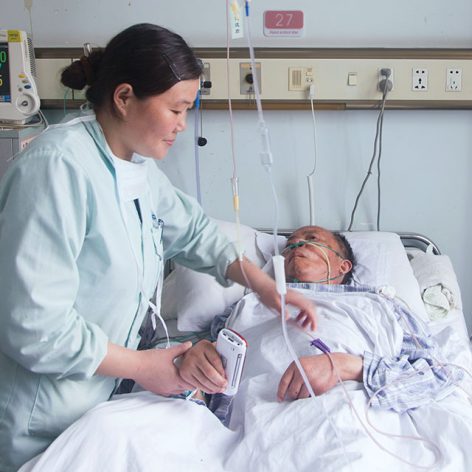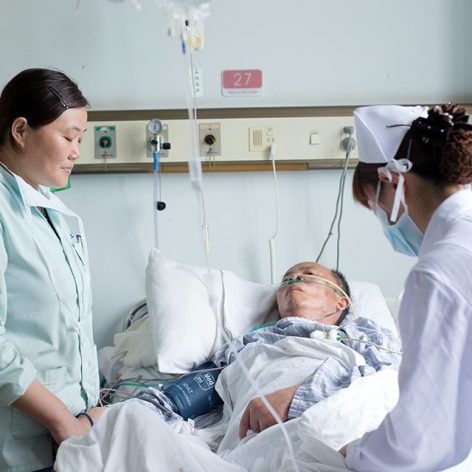Nutritional support, which is integrated in the disease management of critically ill patients, has been shown to improve clinical outcomes such as reducing (infectious) complications, hospital length of stay and even mortality.1Weimann, et al. Espen guideline, Clinical nutrition in surgery. Clinical Nutrition . Published on 2017 ,2Doig GS, et al. Published on 2009 If normal oral intake is not possible, early enteral nutrition, (within 48 hours) by means of oral nutrition supplements or tube feeding is preferred above parenteral nutrition. 3McClave SA, Taylor BE, Martindale RG, Warren MM, Johnson DR, Braunschweig C, McCarthy MS, Davanos E, Rice TW, Cresci GA, et al: Guidelines for the Provision and Assessment of Nutrition Support … Continue reading'4ESPEN Guidelines on Enteral Nutrition: Intensive care. Kreymann KG, Berger MM, Deutz NE, Hiesmayr M, Jolliet P, Kazandjiev G, Nitenberg G, van den Berghe G, Wernerman J, DGEM (German Society for … Continue reading
There has been scientific progress in the field of medical nutrition, and now there is a better understanding of optimal feeding in the critical care setting.5Doig GS, et al. Published on 2009 ,6Casaer MP, et al. Published on 2011 /,7Van Zanten AR . del. et al. Published on 2014 ,8Weijs, et al. Published on 2014 , Both clinical nutrition guidelines and ICU experts have recognised the need for a new, individualised approach to nutritional care.9McClave S, et al. Published on 2009 ,10Dhaliwal R, et al. Published on 2014 , 11Martindale RG, Published on 2015 ,12Evans DC, et al. Published on 2015 ,13Preiser JC, et al. Published on 2015
For surgical patients it is important to reduce the period of starvation just before and after surgery, to prevent inadequate nutrient intake days before and after surgery and to modify the metabolic response to surgical stress. For intensive care unit (ICU) patients it is important to target the right amount of energy and protein intake without overfeeding the patient. For both surgical and ICU patients, there is the challenge to deal with the disease-related compromised gut. Immunonutrition for ICU patients has long been considered to bring additional medical benefits, however most recent guidelines have changed towards not recommending high dosage of immune-modulating nutrients. Immune-modulating nutrients refers to nutrients that aim to alter the immune response.
SCCM & ASPEN Guidelines14Guidelines for the Provision and Assessment of Nutrition Support Therapy in the Adult Critically Ill Patient: Society of Critical Care Medicine (SCCM) and American Society for Parenteral and Enteral … Continue reading
View References
| 1 | Weimann, et al. Espen guideline, Clinical nutrition in surgery. Clinical Nutrition . Published on 2017 |
|---|---|
| 2, 5 | Doig GS, et al. Published on 2009 |
| 3 | McClave SA, Taylor BE, Martindale RG, Warren MM, Johnson DR, Braunschweig C, McCarthy MS, Davanos E, Rice TW, Cresci GA, et al: Guidelines for the Provision and Assessment of Nutrition Support Therapy in the Adult Critically Ill Patient: Society of Critical Care Medicine (SCCM) and American Society for Parenteral and Enteral Nutrition (A.S.P.E.N.). JPEN Journal of parenteral and enteral nutrition. Published on 2016, 40(2):159-211 |
| 4 | ESPEN Guidelines on Enteral Nutrition: Intensive care. Kreymann KG, Berger MM, Deutz NE, Hiesmayr M, Jolliet P, Kazandjiev G, Nitenberg G, van den Berghe G, Wernerman J, DGEM (German Society for Nutritional Medicine), Ebner C, Hartl W, Heymann C, Spies C; ESPEN (European Society for Parenteral and Enteral Nutrition). Clin Nutr. Published on 2006 Apr;25(2):210-23. Epub 2006 |
| 6 | Casaer MP, et al. Published on 2011 / |
| 7 | Van Zanten AR . del. et al. Published on 2014 |
| 8 | Weijs, et al. Published on 2014 |
| 9 | McClave S, et al. Published on 2009 |
| 10 | Dhaliwal R, et al. Published on 2014 |
| 11 | Martindale RG, Published on 2015 |
| 12 | Evans DC, et al. Published on 2015 |
| 13 | Preiser JC, et al. Published on 2015 |
| 14 | Guidelines for the Provision and Assessment of Nutrition Support Therapy in the Adult Critically Ill Patient: Society of Critical Care Medicine (SCCM) and American Society for Parenteral and Enteral Nutrition (A.S.P.E.N.) |





